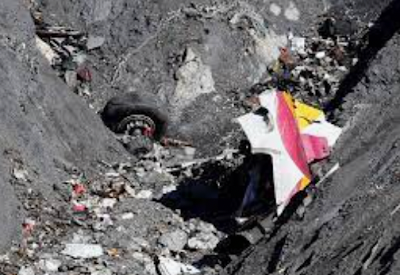Of An Airline
We are approaching the end of Mental Health Awareness month, and with the recent China Eastern Flight MU5735 crash, due to pilot suicide, pilots' mental health continues to be a topic of conversation. However, I believe we should pause for a moment, and shift the focus of this conversation away from the effect and focus on the cause of stress.
There is no justification for harming another person, but every person has a breaking point. Some people are more resilient than others, but that can change overnight if the person works within a toxic environment. Perhaps the industry and the FAA should look at the airline environment.
I listened to Dr. Susan Northrup on the
FAA Podcast on mental health today. The FAA ensures us that it's okay to speak out if you are a pilot who has a problem you cannot deal with, without risk to your certification. She discusses the resources available for coping. Then a pilot assistant member, Ellen, encouraged pilots to talk early and talk often to help eliminate the stress. I would recommend listening to the Podcast and download it. Listen to it because there is good advice, and download it in the event your company management decides to retaliate and claims you're unfit to fly.
My concerns with the FAA's assertions are with the group of FAA approved AME's who are on the "list" to be purchased by airlines for giving false and disqualifying diagnosis. I was recently told by an FAA HIMS AME that "Doctors can be bought" and he asserted "this is a dirty business". Therefore, when an airline can assert a pilot is overly concerned for safety and thinks a manager is out to get her, therefore she must be like the Germanwings pilot, then can pull her from duty with an assertion of mental health, and then subsequently pay a
HIMS psychiatrist $74,000 to give her a diagnosis that "permanently" removes her from flight, how safe is the pilot who seeks help?
My friend recently visited a mental health care professional because of her toxic working environment in what she said "is a very low-stress job". Her comment to me was, "Could you imagine if we faced this in a high-stress job?" Yes, I could, as flying airplanes is a high-stress career. The therapist said that most of us have Teflon skins that can shield anything, but when there are cracks in the Teflon, the snakes get it and can destroy you. A pilot later reminded me that excessive heat also destroys Teflon. How much heat is being applied to pilots?

After the Germanwings crash the FAA and associated task-force groups were formed to determine what could be done to assess the mental health of pilots. But the Germanwings pilot had been through a swinging door of a psychiatric ward for many years and his inadequate performance was well documented. That potential event was not a surprise. That accident was not the typical result of a stressed pilot and could have been stopped. That crash was the result of a broken human and authorities looking the other way.
As a benefit to US Airlines' bottom line, former FAA Administrator Michael Huerta did not require airline pilots to take neuropsychological tests during each physical, saving airlines millions. Huerta asserted that psychological tests are ineffective because they reveal a pilot’s mental health for only a moment in time without providing insight into whether the pilot will suffer problems later. The Germanwings pilot could have been identified as a problem at any point in time by reading his files, not by one of those tests.
Unfortunately, the FAA is still requiring the neuropsychological testing for pilot return due to mental health related issues, despite Huerta's assertion. Those tests are completely unrelated to mental health but are directly related to cognitive ability. Those tests are nothing but brain games that are difficult for anyone to pass without preparation. There is training available, and the tests can also be found on line. Even the Germanwings pilot could have been trained to pass those tests, but that would not have made him a better pilot and would not have solved his mental health issues. The results would have been the same.
Corporate Responsibility and Causation
It's illegal for employees to be forced to work in a toxic environment, so says OSHA. There are laws protecting employees from unsafe environments. Where are the laws to protect pilots from working in a negative safety culture? The FAA has made Safety Management Systems (SMS) a federal regulation that requires a positive safety culture. Yet the FAA is looking the other way and allowing retaliation in the workplace, and "workarounds" of duty time regulations placing pilots on duty for up to 25 hours, of which is a violation of SMS.
Hundreds of pilots across the nation are picketing and fighting for contracts addressing fatigue and work rules. I find it ironic that airline management and the FAA are touting mental health awareness, when one of the primary killers of sound mental health is fatigue. Pilots can handle most anything when they are rested, but push them to an excessive level of fatigue and their skills decline---memory, performance, and coping.
Nobody performs well when fatigued. Performance decreases, tempers raise, mistakes occur, and coping skills lower. A simple view of the ASAP program and the thousands of errors made daily are a result of something. Fatigue? Poor training? Distraction? Work environment is everything to mental health. My friend who was talking to her mental health professional was doing so because of the behavior of a director in her department. What about airline management behavior?
Imagine an airline manager terminating a pilot who was dealing with his divorce, on medical leave, on medication, and he pass traveled and was fired for policy violation. "He forgot to get permission." Yet a director is proven to have retaliated against a pilot for reporting safety and yet nothing happens to him. These situations create an unjust environment and produce a negative safety culture.
When airlines utilize programs like
HIMS to control pilots and assert that everyone in the program is an alcoholic, even if they were forced there for their first-ever glass of wine and got pulled over for a taillight or they would be fired, or were raped. But the pilot's objection to the assertion is identified as "alcoholics behavior". The abuse and hardship in the HIMS program has caused numerous pilots to commit suicide, but is being swept under the rug. These pilots are not killing themselves in a plane, but their lives should matter. The reason they are pulling the trigger should be investigated. When the program is the problem, it should be fixed.
What if airline management retaliates against employees for bringing forth safety concerns, and because management has the power and unlimited stockholder funds they get away with it. What would that do to the mental health of a pilot? I read yesterday, "We should never underestimate how psychologically weakening and damaging it is to be forced to treat as true something that is not true." This applies to those being accused of being alcoholics as well.
How far can airline management push pilots until they break? That breaking point is a moving target for each pilot and differs between individuals. What pushed that extremely senior first officer on China Eastern Flight MU5735, who should have been flying as a captain, to crash his plane?
If airline management and the FAA alike are interested in improving mental health, I believe the focus should be on changing the environment, versus hunting those who have had their teflon cracked due to the work environment.
Sign contracts, honor federal regulations regarding duty time limitations, lead by example, respect your flight crews, and stop working them like pack mules. When a person continually beats a dog with a stick and the dog bites him, whose fault is it?
The current world environment due to Covid, compliance, fear of the unknown, lack of security, finances, family worries, lockdowns, etc., has created an environment ripe for mental health concerns. Mix that with the high stress job of a pilot. Add a huge dose of a toxic environment due to negative safety culture, knowledge that pilots are not protected by regulations because the FAA is allowing airlines to "workaround" regulations and tell me what we should expect as a result? Pilots are human.
I do not support or believe any agency should force medication on a pilot to "find his or her way back to the flight deck" if the reason the pilot is having issues is the result of a negative safety culture. Fix the environment. Don't drug the pilot who reports safety concerns and then is frustrated by the lack of FAA oversight and management's violation of corporate policy and federal regulations and may not manage that frustration well because they are excessively fatigued due to those corporate violations. What coping skills are needed in this situation? Look the other way, or be drugged so you no longer care about passenger safety? Perhaps we should fix the culture.
If the FAA seriously wants to improve mental health, and I believe they do, then Safety Culture and SMS at all airlines should be enforced. AMEs who are known to be purchased should be removed. I know a doctor who knows who these doctors are. Will the FAA start their investigation at his door? Time will tell.
Return Monday to see what we can do to improve mental health.
Enjoy the Journey!
Karlene
PhD, MHS, MBA
























